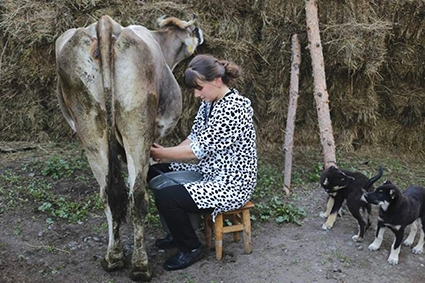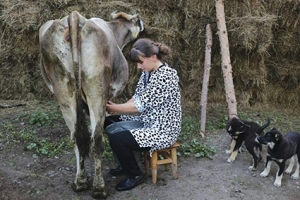Reducing Rural Poverty: Georgia to Benefit from EU Pilot Projects
The European Union (EU) has launched a € 3 million rural project to support and maintain a strong rural community in Georgia.
The project aims to reduce rural poverty in the country and to give opportunities to locals occupied in private agricultural businesses.
The EU supports empowering owners of local development processes in rural areas of Georgia, improving capacities, and providing resources and incentives for better rural services and jobs in a variety of activities related to agriculture, eco-tourism and other rural businesses.
Georgia’s mountain region Kazbegi was the starting point for the EU-funded €3 million support to rural development component under the European Neighborhood Program for Agriculture and Rural Development (ENPARD).
The pilot project, presented to media in Borjomi last week, is part of a program that would cover three municipalities in Georgia - Lagodekhi, Kazbegi and Borjomi -and which would aim to increase public participation in civil matters, develop a varied harvest, and provide resources to assist overall regional development.
The project was initiated in July 2015 and is set to finish in September 2017. The total budget of the pilot project is 1 250 000 Euros, which includes a minimum of 20 small entrepreneurships to be funded.
“The objective of the project is to promote and develop a bottom-up, community driven rural development approach that supports socio-economic development within Borjomi and facilitates future replication throughout Georgia,” Mercy Corps project director Mikheil Lomidze said.
According to Lomidze, the new rural development projects will create Local Action Groups (LAGs), consisting of representatives from local authorities, private sector and civil society, for the elaboration and implementation of local development strategies.“We expect to have approximately 20 members in LAGs of which 49 percent will be from the Government sector and 51 percent will be from the private sector,” Lomidze said.
Minimum funding for project participants is 1000 Euros and for small businesses- 25 000 Euros, while the maximum amount of money given by this project will be 60 000 Euros.
Deputy Minister of Agriculture David Galegashvili said this is a powerful incentive for rural and community development.
While in Borjomi, the media representatives had the opportunity to look into the strategies, methods and innovative approaches in rural development tested by the United Nations Development Programme (UNDP) and Government of Finland under their joint initiative with the Government of Georgia in the Borjomi Gorge.
Journalists also met with local female farmers who had successfully benefited from the EU rural supporting projects.
Borough Tsagveri’s Berries is a small cooperative which was established three years ago and employs 11 workers. The cooperative produces not only fresh berries, but juice, compotes and jam and also offers seedlings for sale.
This cooperative is the only source of income for Nino Melikadze and Irma Magradze, who have been working here since its foundation.
As Nino said, Tsagveri is a touristic spot of Georgia, but when the Russian-Georgian war occurred in Georgia in August 2008, a large area of forest was burnt and tourism reduced. Locals suffered huge economic problems and faced poverty.
“One day, we sat down and thought about ways to get out of the situation. Then international organizations decided to strengthen agriculture in the local area and this project began,” Nino said.
“In the beginning we were very skeptical how we would cope with the business, but now we see that it is profitable and makes our families economically stronger,” Irma said.
“Now I earn around 1500 Lari per month, which was unimaginable before for me. Now we have income and hope for the future,” she said.
The Borjomi pilot project is implemented by NGO Mercy Corps-Scotland along with the Borjomi Municipality and Angus Council of Scotland, with support from the Austrian Federal Institute for Mountainous and Less Favoured Areas.
Furthermore, implementation of the new projects will be facilitated by three international NGOs with recognised experience in rural areas of Georgia: CARE-Austria (Lagodekhi), People in Need-Czech Republic (Kazbegi) and Mercy Corps-Scotland (Borjomi).
Georgia is at present benefitting from €52 million support to agriculture and rural development through the EU-funded ENPARD programme.
On this basis, EU support to rural development over the next years will be expanded to other regions, helping Georgia to establish a successful rural development policy following the best practices across Europe.
Tamar Svanidze











